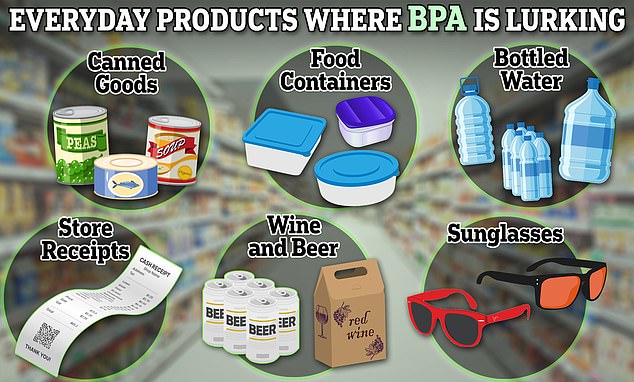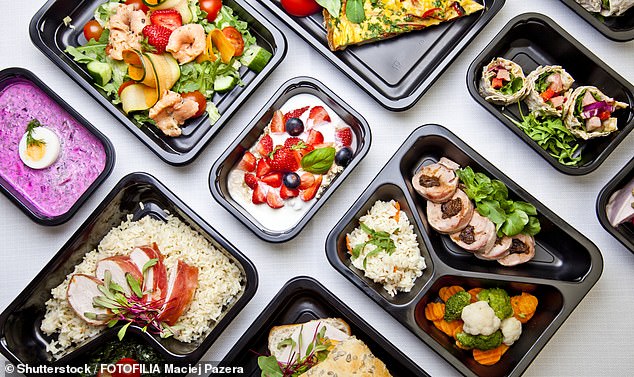- Researchers found up to 9,936 different chemicals in a single plastic product
- These included the hormone disruptors bisphenol A (BPA) and phthalates.
- READ MORE: The chemicals in your garage that may increase your risk of ALS
A single plastic box of takeaway sushi or curry can contain up to 10,000 hormone-disrupting chemicals that leach into the food, with potentially harmful consequences, a new study has found.
Norwegian researchers tested different plastic food packaging from around the world and found that almost all of them contained substances that interfere with the body’s hormones or metabolism.
The chemicals included bisphenol A (BPA) and phthalates, which are known to be hormone disruptors and have already been banned in large quantities in certain products such as baby bottles.
Exposure to these microscopic chemicals has been linked to a number of health problems, including obesity, diabetes, reduced fertility, and certain cancers.
“We found up to 9,936 different chemicals in a single plastic product used as food packaging… we need to redesign the plastic to make it safer,” said study co-author Martin Wagner, professor of biology at NTNU.
Chemicals from plastics can migrate into food. Previous research has also shown that plastic products leach chemicals when immersed in water.

BPA is relatively common in food packaging, cans and plastic containers despite the well-established harmful effects it has on the human body, such as infertility and certain types of cancer.
A recent report A Consumer Reports study found that 99 percent of 85 foods and drinks it analyzed contained plasticizers, chemicals used to make plastic more flexible and durable.
The researchers involved in the latest study, from the Norwegian University of Science and Technology (NTNU), tested 36 different plastic food packaging products from the US, UK, Germany, Norway and South Korea, using a process two steps to determine what chemicals were hidden in the plastic.
To start, each plastic container was cut into smaller pieces and the plastic was dissolved in methanol.
This allowed scientists to extract the chemicals in liquid form.
The chemical mixtures were then put through a series of laboratory tests using human cells to see if they activated or blocked human receptors involved in regulating our hormones and metabolism.
The tests included receptors for key hormones such as estrogen and testosterone. In women, estrogen contributes to reproductive and breast health, as well as cognitive and bone health. Testosterone regulates bone mass, fat distribution, muscle mass and strength.
The scientists found that 33 of the 36 plastic products interfered with the activity of the pregnancy X receptor, which is necessary for detoxifying foreign substances and also plays a role in controlling blood sugar and fat metabolism.
Some 23 of the products contained chemicals that activated the peroxisome proliferator receptor, which is believed to be the main regulator of fat cell development.
Chemicals that blocked testosterone receptors were found in 14 products and chemicals that mimicked estrogen in 18 of the products.
But the researchers couldn’t fully identify what the disruptive chemicals were.
A single piece of plastic can contain thousands of different chemicals, many of which are unknown or poorly studied.
However, they did find some common chemicals, such as bisphenol A (BPA) and phthalates.
But the study suggested that even BPA-free plastics contain other endocrine-disrupting substances that have not yet been identified.
The researchers said people should remove food from plastic containers and store it in glass or stainless steel containers, especially when reheating.
Consumers should also prioritize fresh produce that comes without packaging to reduce exposure to chemicals, they said.

